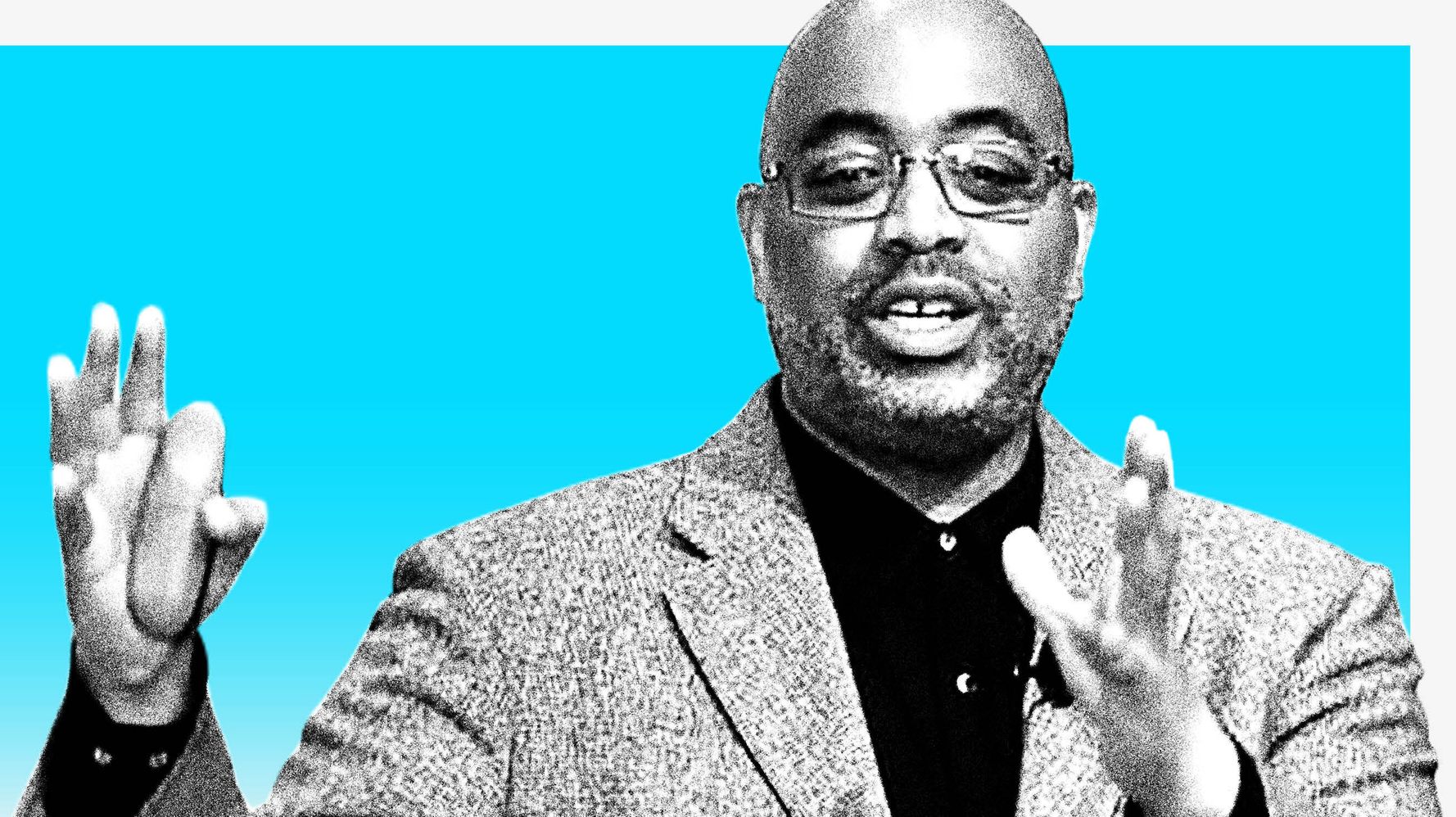[ad_1]

Adrian Miller, aka the Soul Food Scholar, is a food historian and the author of the James Beard Foundation Award-winning book “Soul Food: The Surprising Story of an American Cuisine, One Plate at a Time.” As he tells Rebecca Treon in our Voices of Food series, “Food is a very powerful tool for reconciling issues.”
Miller served as a special assistant to President Bill Clinton with his Initiative for One America, dedicated to addressing issues of racial, religious and ethnic reconciliation. Miller has served on the board of the Southern Foodways Alliance and is also the author of “The President’s Kitchen Cabinet: The Story of the African Americans Who Have Fed Our First Families, From the Washingtons to the Obamas.”
Amid continuing protests over the killings of Black Americans, here’s what Miller told us, in his own words, about allyship in the fight for racial justice and how we can all contribute to systemic change.
At a recent protest, I noticed that the crowd was overwhelmingly white. A lot of white people are waking up, and I have my thoughts as to why [they’re doing so] now, instead of when there were so many opportunities previously ― but I think that this time around, the video of George Floyd’s death is just so graphic and horrific, that that’s what’s pushing people over the edge.
There have been videos before ― Eric Garner died in a very similar way ― and people were pissed off, but we didn’t see this level of it. The length of time it took to kill George Floyd, and he’s saying, “I can’t breathe,” he’s calling out to his mom, who is dead … I think that really just galvanized people. For whatever reason, people may not have connected to the humanity of the other people who had died, but this just pushed people over the edge.
I’ve been trying to figure out my role in being someone who can create a shared future, where we do have racial justice and so many other forms of justice that are needed, and then I think about the words of Gianna Floyd, who is George Floyd’s 6-year-old daughter, who said, “My daddy changed the world.” So my hope is that more white people are paying attention. In the past, we’ve had numerous instances where there was outrage and protests, but ultimately, very little happened. I’m wondering if, in this moment, we can finally make those words come to full fruition ― that we change the world.
I’ve always maintained that if we’re ever going to get a breakthrough on race, white people need to work this out amongst themselves. Because no matter what I say or whatever other people of color or marginalized people say, it gets discounted at some level or outright dismissed by the white people who hear it.
Or I can’t really get to a point of engaging in real dialogue because the white people who don’t know me are really scared to say what’s in their heart. And even the ones who know me are pretty scared to say what they really feel.
“White people need to work this out amongst themselves. Because no matter what I say or whatever other people of color or marginalized people say, it gets discounted or outright dismissed at some level by the white people who hear it.”
When people wonder what they can do to start being an ally, I tell them to “do what you can where you are,” which is a phrase I borrowed from my friend Toni Tipton Martin. You go through all the things you think you can do, and then when you exhaust those, it’s time to think, “Maybe I need someone else to show me what I can do.” Raise the question out loud, because there’s stuff that you may not have even thought about.
I think an important step is, there needs to be the creation of white spaces where white people are talking to each other in a meaningful way and coming up with ways to address white supremacy in their own community.
Second, there has to be what I call Welcome Tables (referring to the gospel song), where we create spaces for people of different perspectives to come and discuss really tough things. Some may completely disagree, but people need to come together, and no one has the moral high ground.
People need to feel safe actually saying what’s really on their mind and then listen, even if there’s whack stuff coming out of the other person’s mouth, and hear them and try to understand. Just try to recognize the humanity of that person on the other side of that dialogue. If the two of you can’t come to an agreement, you have to just hold the tension that you disagree.
I think there’s a lot of frustration in our society right now because people just feel like they’re not being heard, they feel like they’re not being taken seriously, and they feel like they just don’t have any power. We have to change the system, and that means that as damaged as our institutions are, especially our democratic institutions, at their core they still give power to the people. It’s hard to see it sometimes, but politics is truly the art of the possible. We can reform all of this.
I talk in my forthcoming book, “Black Smoke,” about how certain foods have negative racial stereotypes, and food actually becomes weaponized. In the late 1800s, it really ramped up because Black people had newly-invented political and social rights, so media leaders had to build a case to undermine those rights and eventually limit them. And they used food to create the idea that Black people are inferior, childlike, beast-like ― basically that they weren’t really humans, so why are they getting these rights? Barbecue was used that way ― it wasn’t just fried chicken or watermelon, it was all the same food white people ate ― but it became weaponized. To this day, I have Black friends who won’t eat fried chicken if white people are around.
I have gravitated toward food because I think food is a very powerful tool for reconciling issues. When you sit down at the table with someone, you recognize their humanity, looking at cooking food as an act of love because as the cook is saying at some level, “I care about your survival.” Even if the food is straight nasty, it’s the access. It’s a sign of love. Food disarms people. It makes them more comfortable and creates a space to build relationships and get to know each other so that you can then go on to talk about the really tough things. I think food can just be used in myriad ways to bring people together so we can work some of the stuff out.
“Food disarms people. It makes them more comfortable and creates a space to build relationships and get to know each other so that you can then go on to talk about the really tough things.”
Now is the time to support Black people ― and people have been great about checking in with their Black friends ― but when you’re checking in with your Black friends, just understand that the African American community is not monolithic. So you need to listen. You are going to hear a lot of different stuff about what needs people have and about what they’re feeling and what needs to be done.
People can support Black businesses with their dollars, and it sounds trivial, but if there are people in the world that you think are doing good things, support them by following them on social media and encourage other people to follow them, too. Social media is the coin of the realm these days. Amplify their voices by sharing the good stuff they’re doing. When someone is looking for influence-makers, they’re looking at the followers ― like Samin Nosrat from “Salt Fat Acid Heat,” she has like half a million Instagram followers, and she posted a picture of me and said “Follow Adrian Miller,” and she did this for several other Black people in the food space, and it doubled my Instagram followers in like two days. That’s somebody who supports and amplifies Black voices.
To be even more specific, in terms of supporting Black business ― hire Black caterers and chefs for your events, go to Black-owned restaurants as much as you can, and if you don’t have much money, lend your talents to people in the food space or other Black entrepreneurs or causes. Maybe you can handle the social media for a Black restaurant, especially if you know they’re struggling. If you’re good at business consulting, or you have specialized skills that a small business could benefit from, volunteer to offer them at a discount. What I’ve found with a lot of Black food entrepreneurs is that they’re good at making food, but running a business presents challenges.
People can create opportunities for us by buying our products, by inviting us for paid speaking opportunities or paid positions as board members. It’s just going to take some creativity, and we need to start cultivating what I call reconciliation entrepreneurs; these are creative and talented people who figure out innovative ways to bring people together. People need to be told a story or be convinced to do something to engage. For those of us who want to see a better future, we have to tell stories that motivate people to join us to build that future.
[ad_2]
Source link

